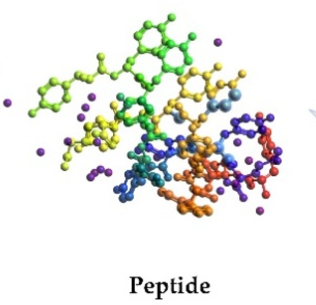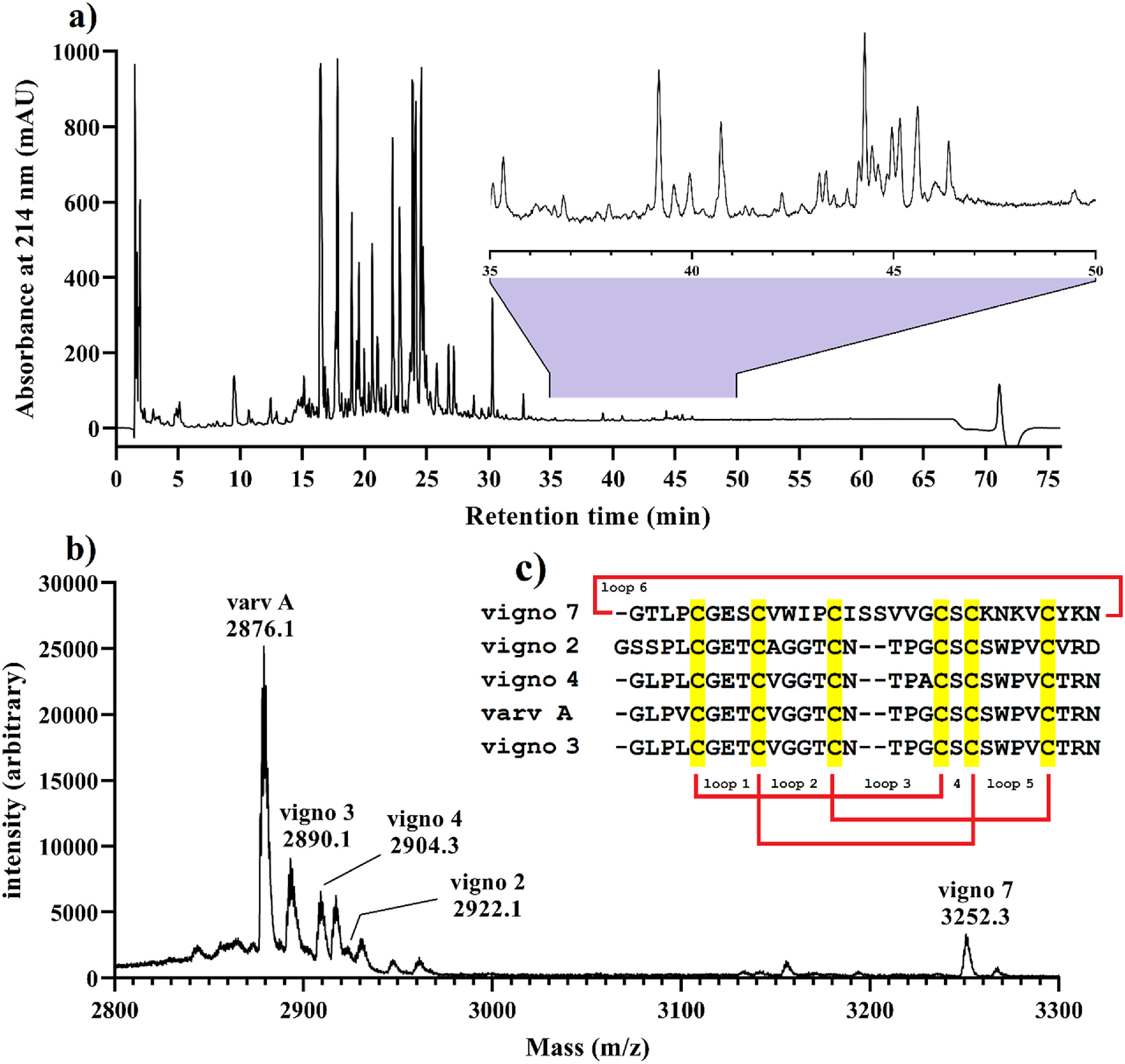Peptide Services
Peptide services primarily offer peptide analysis and synthesis services including peptide identification, quantification, sequencing, purity testing, amino acid composition analysis, peptide mapping, and synthesis, among others. A peptide is a molecule formed by linking amino acids through peptide bonds, and it is a fundamental component of proteins. Peptides serve various biological functions, including acting as hormones, neurotransmitters, antibodies, and antimicrobial agents. Research on peptides can provide support for proteomics studies, immunology research, drug development, antibody research, and more.

Tertis M. et al. Molecules. 2021.
Chromatography and mass spectrometry are commonly used techniques in peptide services for peptide analysis, primarily employed for peptide separation, identification, quantification, and sequencing. Chromatography is mainly used to separate peptides from complex samples and to analyze peptide purity. The principle behind chromatography is based on the distribution difference of chemical components between two phases (usually a stationary phase and a mobile phase). Mass spectrometry is mainly used to analyze the molecular weight, amino acid sequence, modification status (such as phosphorylation, glycosylation, etc.), and quantitative information of peptides. The principle of mass spectrometry involves measuring the mass-to-charge ratio (m/z) of charged particles to provide molecular information.
Peptide synthesis mainly relies on two methods: solid-phase peptide synthesis (SPPS) and liquid-phase peptide synthesis (LPS). SPPS, due to its efficiency and automation advantages, is the preferred method in most laboratories. The basic principle of SPPS is to fix the C-terminal or N-terminal of the peptide chain onto a solid support (usually a resin), and then gradually connect different amino acids through chemical reactions.
With advanced peptide synthesis technology and chromatography and mass spectrometry analysis platforms, MtoZ Biolabs offers peptide services including peptide synthesis and a range of peptide-related analysis services. Feel free to contact us for customized services.
Service Advantages
1. Advanced Analysis Platform: MtoZ Biolabs established an advanced peptide services platform, guaranteeing reliable, fast, and highly accurate analysis service.
2. One-Time-Charge: Our pricing is transparent, no hidden fees or additional costs.
3. High-Data-Quality: Deep data coverage with strict data quality control. AI-powered bioinformatics platform integrates all peptide services data, providing clients with a comprehensive data report.
Services at MtoZ Biolabs
MtoZ Biolabs offers a comprehensive range of Peptide services covering various aspects from peptide synthesis, analysis, to functional studies. Below are some of the peptide service offerings:
1. Peptide Synthesis Services
Solid-Phase Peptide Synthesis (SPPS): Synthesis of peptides of different lengths and types using the solid-phase synthesis method.
Liquid-Phase Peptide Synthesis (LSPS): Suitable for synthesizing peptides requiring high purity and specific functionalization.
Labeled Peptide Synthesis: Includes isotope labeling, fluorescent labeling, etc., for tracking and quantitative analysis.
Modified Peptide Synthesis: Synthesis of post-translational modifications such as phosphorylation, glycosylation, acetylation, etc.
2. Peptide Analysis Services
Mass Spectrometry (MS): Used for peptide identification, quantification, and sequencing analysis.
High-Performance Liquid Chromatography (HPLC): Used for peptide purity testing and separation.
Amino Acid Composition Analysis: Detects the types and quantities of amino acids in peptides to ensure the correctness of the synthesis.
Peptide Mapping: Peptide mapping analysis using LC-MS/MS to obtain full sequence information.
3. Peptide Functional Analysis
Antigenicity Evaluation: Assesses the application of peptides in immunology, such as ELISA, Western Blot, etc.
Receptor Binding Tests: Tests peptide-receptor binding capability through methods like ELISA.
4. Peptide Customization Services
Custom Synthesis: Synthesis of peptides with specific sequences and modifications according to client needs, suitable for research or drug development.
Peptide Library Design and Synthesis: Designing and synthesizing peptide libraries targeting specific targets or diseases, followed by screening and analysis.
FAQ
Q. How can peptide information in complex biological samples be effectively processed to improve the accuracy of analysis results?
To improve the accuracy of peptide analysis in complex biological samples, effective sample preparation is essential, including steps such as peptide extraction and separation. A common strategy is to combine liquid chromatography (LC) with mass spectrometry (MS) for peptide separation in complex samples. Additionally, using specific separation methods such as strong cation exchange chromatography or reverse-phase chromatography can help reduce interference from impurities and improve the accuracy of target peptide analysis. High-quality database search algorithms, such as SEQUEST or Mascot, can be used to achieve accurate peptide matching and quantification. Finally, employing standardized mass spectrometry techniques like TMT labeling or SILAC labeling can enhance the accuracy and reproducibility of sample comparison analyses.
Q. How can the quality of peptide synthesis be ensured?
To ensure high-quality peptide synthesis, it is crucial to control every step of the synthesis process. The following approaches can help achieve this:
1. Choice of Synthesis Method: The most commonly used method is Solid Phase Peptide Synthesis (SPPS). Selecting the appropriate synthesis strategy can help avoid common issues such as chain breakage and mismatching.
2. Use of Protecting Groups: Choosing the correct protecting groups for amino acid side chains ensures that no unnecessary side reactions occur during the synthesis process.
3. Optimization of the Synthesis Environment: Strict control of reaction temperature, time, and the type and concentration of solvents is necessary to prevent adverse reactions that could affect the synthesis quality.
4. Purity and Cleanliness Monitoring: After synthesis, the purity and structure of the peptide can be verified using techniques such as mass spectrometry and HPLC to ensure the peptide meets the required specifications.
Case Study
The study separated and analyzed the peptide compounds in the plant extract viola ignobilis using mass spectrometry and chromatography techniques. The results indicated that certain specific peptides exhibited significant toxic effects on target pests, inhibiting their growth and reproduction. The significance of the study lies in its first-time revelation that the peptide components in viola ignobilis have potential biological insecticidal functions, providing a molecular basis for the development of novel plant-based insecticides.

Taghizadeh M S. et al. Heliyon. 2024.
MtoZ Biolabs, an integrated chromatography and mass spectrometry (MS) services provider.
Related Services
How to order?







